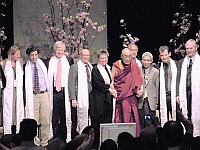| < Prev | Next > |
|---|
"We have always known that heedless self-interest was bad morals: now we know that it is bad economics." (Franklin D. Roosevelt)
 The following is an article written by Rod Nelson, a UK artist, after having recently attended the 20th Annual Mind and Life Conference in Zurich, which was entitled 'Altruism and Compassion in Economic Systems'. The article is planned to be published by Resurgence Magazine. Copyright Rod Nelson. The integrated slide show features woodblock prints by Rod Nelson.
The following is an article written by Rod Nelson, a UK artist, after having recently attended the 20th Annual Mind and Life Conference in Zurich, which was entitled 'Altruism and Compassion in Economic Systems'. The article is planned to be published by Resurgence Magazine. Copyright Rod Nelson. The integrated slide show features woodblock prints by Rod Nelson.
Chaired by the Dalai Lama
What has Buddhism to do with economics? This question is the starting point for the conference entitled 'Altruism and Compassion in Economic Systems' held in Zurich in April 2010, under the auspices of the Mind and Life Institute.
Twentieth Conference Held in Zurich
The Institute is the result of an extended and profound intellectual discussion between the Dalai Lama, his immediate entourage and Western neuroscientists and psychologists. This is the twentieth of a series of annual conferences, hitherto held in the USA, during which a series of high-level presentations from Western scholars and scientists are made to the Dalai Lama.
The Choice of Zurich
The choice of Zurich, a lovely venue which is also a by-word for aggressive European banking, is particularly appropriate. The underlying climate of greed in the financial sector, exemplified by the ‘bonus culture’ and the phone-number salaries of senior bankers, appears to have been an important symptom (even if not cause) of the global economic crisis. Rash speculative trading in the stock markets and a hunger for quick cash returns create enormous downstream pressures upon individuals and political and economic structures alike.
The Global Economic Crisis as a Spiritual Failure
The self-serving factors predominating at the very heart of our economic system make this conference particularly relevant at this time. William George, Professor of Management Practice at Harvard Business School sums it up.
"The Global Economic Crisis was a spiritual failure. Greed was supposed to lead to more goods. More goods were supposed to lead to more happiness. It didn’t work. Now millions don’t have work and there is great destruction."
Compassion instead of Self-Interest?
The search for a better economic model than our present one is a major intellectual challenge. According to William Harbaugh, Professor of Economics at Oregon University, economists have hitherto relied upon self-interest, not compassion, as the single motivating factor used to describe economic systems. This may be a reason why economics has earned the epithet of 'The Dismal Science'. Yet there are some very respected economists who are determined to seek ways to encompass a more sophisticated, and more holistic model.
Divergence of Economic Growth and Happiness
Lord Layard, Emeritus Professor of Economics at the London School of Economics describes economics as 'The science which aims to show how the greater society can provide the greatest happiness for the greatest number of people'. In support of this contrastingly noble vision of economics he urges us to accept that economic theory is not a conspiracy but an attempt to describe reality and predict the future.
Richard Layard's dissatisfaction with current economic models stems from a graph which plots the steady growth of material wealth against levels of happiness in developed countries. As we have got wealthier and disproportionately used more of the world’s resources, we have not become happier. The dramatic divergence shown between happiness and wealth represents, in Lord Layard's view, a breakdown in the conventional model of economic theory.
Competition and Altruism
Happiness is connected with empathy and altruistic patterns of behavior, just as greed and egoistic self interest are linked with mental suffering. Yet competition within economic systems is vital to their optimum functioning and of course, competition is not necessarily fertile soil for the growth of altruism. Lord Layard tells us that this is a conundrum which needs to be faced by economists as well as by leaders of human society, managers and politicians. Just as greed appears to be an innate quality of the human animal, is there any evidence to show that altruism is also innate within us as part of our intrinsic psychological make-up? To seek answers to this question, hard evidence from the fields of anthropology and experimental psychology are required.
Professor John Silk
Joan Silk, Professor of Anthropology at the University of California is probing behavior patterns in higher primates, where there is strong evidence of apparently altruistic behavior such as grooming. Altruism here is defined as 'a motivational state with the ultimate aim of increasing the welfare of others'. However, she notes that altruism is restricted purely to family and immediate group members.
Within human economic systems, is altruism restricted as it is in other primates or does it encompass society or even human-kind as a whole? Is egoistic and self serving behavior the norm, as current economic theory assumes?
Professor Ernst Fehr
Professor Ernst Fehr, Director of the Institute for Empirical Research in Economics at the University of Zurich is also concerned with hard evidence. He comments 'We need to distinguish between what we think we know and what we actually know.' To do so, he is currently devising ingenious games, played by volunteers using real money and real financial benefit accruing to participants. A series of tentative conclusions are emerging and they are somewhat perplexing.
Professor Fehr notes that 'The more people believe that others are behaving altruistically, the more they are prepared to behave altruistically themselves.' However, when there is a perception of unfairness, when there are 'free-riders' within a system who behave egoistically or greedily, the altruistic mode is immediately extinguished, and trust is lost.
Influence of Egoistic Members on Altruistic Behavior
Prof. Fehr's research shows how a very few egoistic members can extinguish altruistic behavior within a relatively much larger group of otherwise altruistic individuals. As he develops his models, the games are becoming more and more sophisticated. By allowing altruistic members of groups to sanction and even punish egoistic behavior by free-riders in a group, trust in the system is restored and altruism re-emerges.
An intriguing finding emerges in relation to 'free-riders'. Men and women react to them in quite different ways, and he notes that these differences appears to be innate. Men are far more punitive and less flexible.
Prof Fehr goes beyond observation of behavior within economic models into the important field of neuroscience. By using brain scanning technology in association with behavioral research, he is able to see that altruism is showing up in the dopamine-modulated 'reward' area of the brain. From this it can be scientifically demonstrated that altruism is psychologically rewarding. Giving carries a powerful 'feel-good' factor for the giver.
Buddhist Mind Training
So where does this lead in relation to Buddhism? Buddhist mind-training in relation to the capacity for empathy and compassion is the field in which the Mind and Life Institute was founded. Professor Richard Davidson, Director of the Laboratory for Affective Neuroscience at the University of Wisconsin was one of the original scientists who, along with the late Dr Francisco Varela, worked with the Dalai Lama to obtain neuroscientific evidence from long-term practitioners of meditation using increasingly sophisticated magnetic resonance imaging and electroencephalogram (EEG) technology.
This is an area that is extensively covered in other conferences of the Mind and Life Institute. However, Professor Davidson says that there are important links between mental states and altruistic behavior. In controlled studies using meditation in conjunction with altruistic game play, his findings indicate consistently that more altruism is displayed by meditating participants than by the non-meditators. Furthermore, the pro-social pattern of altruism is a self-reinforcing mechanism. 'The more one re-distributes, the more empathic one is'.
Richard Davidson’s work indicates that empathy, altruism and compassion are factors which are innate within human behavior, which work together for social cohesion, which lead to greater happiness and which can be taught.
Altruism and Personality
These findings beg a series of further and important questions for research which were raised by Prof. Fehr. Are there particular personality differences in the degree of altruism? If so, how can these personality factors be shaped in a positive direction? Can we avoid envy or is that also human nature?
Is there a critical time-window in which altruism can be optimally nurtured? Do we need the findings of Buddhism for the nurture of a more altruistic society? The consequences of our present non-compassionate society are largely hidden from the day to day life that we lead.
One particularly distressing consequence is in the mistreatment of animals and the natural environment. Matthieu Ricard, a remarkable Frenchman from a distinguished intellectual family, who holds a PhD in neuroscience and has for more than twenty years been an ordained monk in a Tibetan tradition, said of this 'The way we treat animals is an unimaginable capacity to ignore the feelings of others.' To laughter, he urges us to 'Put ourselves in the shoes of a fish'. Matthieu Ricard says that compassion and altruism are not perceived properly as a skill, a skill that can be developed with effort and application. It is not enough to empathize because simply to resonate with suffering results in compassion-fatigue.
Training in Compassion
Training in compassion is capable of liberating in each individual practitioner a river of loving-kindness. When an individual can attain this state, burn-out is not a consequence of exposure to suffering. Whilst these skills might be thought to be a Buddhist domain they are in fact quite secular in their nature.
The Dalai Lama is unique among religious leaders in calling for a secular approach to be developed for the development of compassion. There are some hopeful initiatives which might point the way towards a new kind of economics. Within the conventional banking sector ‘ethical investment’ is a relatively well established phenomenon and is capable of attracting significant market share among investors who have a moral perception – for instance church funds and charitable endowments as well as private investors. They are yielding comparable returns to ‘mainstream’ (i.e. not ethically selected) funds. This is the message from Antoinette Hunziger-Ebneter, previous head of the Swiss stock exchange and now director of Forma Futura, an 'ethical' asset management company based in Zurich.
Microfinance Initiatives
Microfinance initiatives are another potentially 'ethical' field which is of interest to mainstream bankers. Arthur Vayloyan, Head of Investment Services at Credit Suisse described the robust growth in microfinance, which has grown exponentially in the last nine years to become a major investment portfolio for the bank with billions of francs available for lending. Microfinance consists of very small sums loaned on very short term basis (sometimes even on a daily basis) to individuals and organizations in impoverished countries.
Herr Vayloyan describes the immunity of microfinance to the global crisis, avoiding as it does the mainstream money markets. He goes on to describe how entrepreneurial people in very poor countries, caught between impoverishment and loan sharks now have ‘a third way’, a regular way, to fund their micro-enterprises.
Closing Session with the Dalai Lama
Inevitably the last word is left to the Dalai Lama, and all eyes are on him at the closing session. His radiant humor and sparkling intelligence has filled the great hall for three days. The sense of respect for him is maybe not astonishing, given his background, yet for each and every person in that room it is impossible not to be moved by his presence.
His frequent questions and pithy interventions have enlivened every presentation and several times he has had the whole room in uproarious laughter. Many questions are left in the air, but a sense of purpose and optimism prevails, despite this conference being but the first step of a tremendous journey to find a new economics which encourages more holistic values.
The Role of Buddhism
The Dalai Lama is asked about the apparent central role in this debate which Buddhism appears to hold. He refutes this. 'Buddhism' according to the Dalai Lama, 'is but one of a number of religions. Different dispositions require different approaches.' He believes that a religion-based approach to economic problems is not in itself a panacea. 'Non-believers including many scientists are also part of the greater society. Therefore, training methods for practices which encourage empathy and altruism must be secularized in order to reach all people. Maybe some of these practices originate in Buddhism, because Buddhist science is very detailed about emotion.'
The Dalai Lama tells us that 'no man and no woman wants the problems caused by no-compassion'. These problems are caused by ignorance and by what he calls 'forget-inner-value'. 'In the end, it doesn't matter if you think all religion is bad.' says the Dalai Lama 'Just be a more kind person’. 'Overcome ignorance and find better inner values so that the mental stress may reduce and more happiness result. This is our work isn't it?'
Rod Nelson, April 2010 - all copyrights Rod Nelson
(Headings were added by artelino for better readability on the web.)























